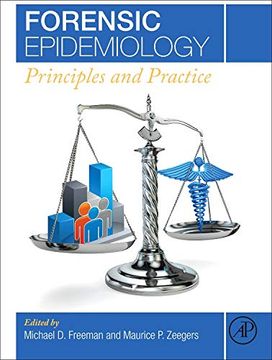Reseña del libro "Forensic Epidemiology: Principles and Practice (en Inglés)"
It is an inescapable fact that causation, both generally (in populations), and specifically (in individuals), cannot be observed. Rather, causation is determined when it can be inferred that the risk of an observed injury or disease from a plausible cause is greater than the risk from other plausible causes. While many causal evaluations performed in forensic medicine are simplified by the fact that the circumstances surrounding the onset of an injury or disease clearly rules out competing causes (eg, a death following a fall), there are many cases that present a more complicated picture. It is these types of investigations, in which an analysis of comparative levels of risk from competing causes is needed to arrive at a reliable and accurate determination of the most likely cause, that forensic epidemiology (FE) is directed at.In Forensic Epidemiology, the authors present the legal and scientific theories underlying the methods by which risk is used in the investigation of individual causation. Methods and principles from epidemiology are combined with those from a multitude of other disciplines, including general medicine, pharmacology, forensic pathology, biostatistics, and biomechanics, inter alia, as a basis for investigating the plausibility of injury and disease exposures and mechanisms. The ultimate determination of the probability of causation (PC) results from an assessment of the strength of association of the investigated relationship in the individual, based on a comparison between the risk of disease or injury from the investigated exposure versus the risk of the same disease or injury occurring at the same point in time in the individual, but absent the exposure. The principles and methods described in Forensic Epidemiology will be of interest to those who work and study in the fields of forensic medicine, epidemiology, and the law. Historical perspective on how epidemiologic evidence of causation has been used in courts in the US and EuropeTheory and science underlying the use of risk to assess individual causationPrimer on epidemiologic methods, and various measures used to arrive at individualized comparative risk assessments and PCThe use of statistical methods applied to publicly available data for ad hoc analysis of PC applicable to the specific circumstances of a caseBackground on complementary disciplines, including forensic pathology, death investigation, biomechanics, and survival analysisExamples of applied FE in the investigation of traffic injury and death, automotive and other product defect litigation, medical negligence, and criminal prosecution and defense

